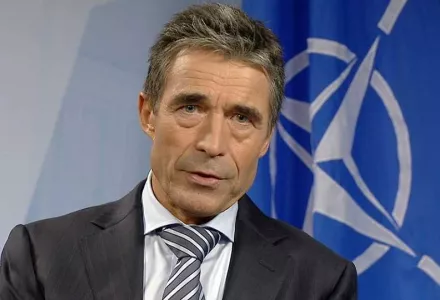As part of the Future of Diplomacy Project's annual "Europe Week," former Prime Minister of Denmark and former NATO Secretary General, Anders Fogh Rasmussen reflects on the state of the transatlantic relationship in a pivotal year when it is challenged by increasing Russian territorial maneuvers at Europe's Eastern borders, the shifting threat of ISIS, European economic woes and difficult, protracted negotiations around the Trans-Atlantic Trade and Investment Partnership (TTIP).
Anders Fogh Rasmussen is a spring 2015 Fisher Family Fellow with the Future of Diplomacy Project. Rasmussen has been at the centre of European and global politics for three decades as Secretary General of NATO, Prime Minister of Denmark, Danish Minister of Economic Affairs, and a leading Danish parliamentarian.
During the Danish Presidency of the European Union from July to December 2002, Rasmussen played a key role in concluding the accession negotiations with 10 candidates for EU-membership. Rasmussen has often mentioned the EU Summit in Copenhagen in December 2002 as a truly historic event and one of the highlights of his political career. He firmly believes that the enlargements of the EU and NATO have contributed to peace, progress and prosperity in Europe.
Anders Fogh Rasmussen took office as the North Atlantic Treaty Organization’s 12th Secretary General on 1 August 2009 and held that position until 30 September 2014. His tenure marked a fundamental transformation of the Alliance. Rasmussen oversaw the Alliance’s operational peak with six operations on three continents including Afghanistan, Kosovo and Libya, as well as counter-piracy along the Somali coast, a training mission in Iraq and a counter-terrorism operation in the Mediterranean.
He developed a new Strategic Concept, which sets the Alliance’s core priorities for the future. In the midst of the most serious economic crisis in recent time, he launched “Smart Defence” to help nations make more efficient use of their resources through more multinational cooperation. And in response to Russia’s aggression against Ukraine, he initiated a “Readiness Action Plan” adopted by Heads of State at a historic summit in Wales to strengthen the collective defence to an unprecedented level since the end of the Cold War. A reformer who made the Alliance leaner and more efficient, Rasmussen also extended and strengthened NATO’s partnerships with nations around the world, making it the hub of a network of international security partnerships.

